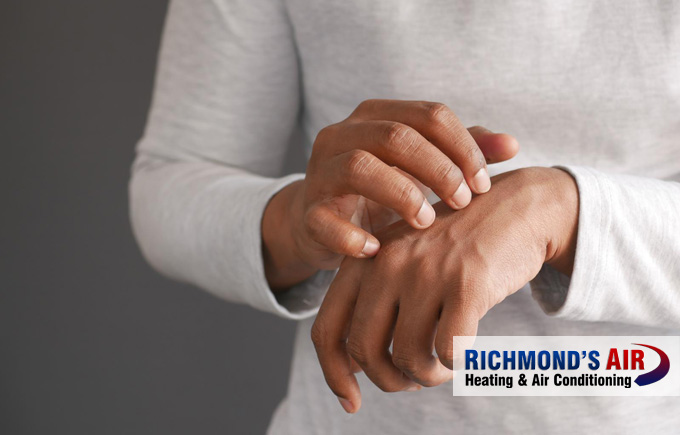Eczema is a persistent condition that can cause dry, itchy skin that often feels raw and painful. It can affect any area of the skin but is most commonly found on the elbows, knees and scalp. Eczema can cause itching that is so severe that it makes it difficult to concentrate or even sleep. The severity and location of symptoms can vary significantly from person to person.
Common types of eczema
There are 7 different types of eczema, all of which have their own causes, triggers and treatment. They include:
- Atopic dermatitis
- Contact dermatitis
- Dyshidrotic eczema
- Neurodermatitis
- Nummular eczema
- Seborrheic dermatitis
- Stasis dermatitis
The most common type of eczema is atopic dermatitis—an inherited condition that causes dry, itchy skin and redness. It typically appears during early childhood and affects all areas of the body, but most often affects the hands, face, scalp, and folds of skin on the arms and legs. Atopic dermatitis is more common in people who have asthma or hay fever.
How common is eczema?
According to the National Eczema Association, approximately 10 percent of the population—or about 31.6 million people in the U.S.—have eczema, including about 9.6 million children under the age of 18.
Studies have shown that 80 percent of people with eczema experience their first symptoms before 6 years of age, and approximately 80 percent of children with eczema will “outgrow” it before adulthood.
What causes an eczema flare-up?
Eczema can be triggered by a number of factors, which vary from person to person. Some of the most common causes of eczema flare-ups include:
- Allergens. When you’re exposed to certain irritants, such as pollen or pet dander (the hair from pets), your body sends out a signal that it’s under attack and releases chemicals called histamines to fight off the threat. This reaction causes itching and irritation of the skin, which can lead to eczema flare-ups.
- Stress. Chronic and even acute stress can cause inflammation in your body that may lead to eczema flare-ups and other conditions like asthma or insomnia (when you don’t get enough sleep).
- Temperature changes. Temperature changes can cause your skin to become more sensitive. For example, a hot shower or bath can irritate your skin. Other triggers include cold weather or extreme heat.
Difference between humidifiers and dehumidifiers
The main difference between humidifiers and dehumidifiers is that humidifiers add moisture to the air and dehumidifiers remove it.
When the air is excessively dry, as is often the case in areas of the U.S. that experience harsh winter weather, humidifiers can add much-needed moisture to an indoor space. Because of this, many people use humidifiers in their homes throughout the winter season.
On the other hand, when the air is overly humid, as is the case in many areas in the spring and summer, a dehumidifier can decrease moisture in an indoor space. Two of the main reasons people use dehumidifiers are to help control seasonal allergies and get rid of the sticky, musty sensation of a damp home.
Is a humidifier or dehumidifier better for eczema?
Whether you choose to use a humidifier or dehumidifier in your home will depend on the season, your environment and the level of humidity you’re trying to achieve.
In many cases, a humidifier is typically a good choice for people with eczema who want to increase the humidity in their home to help relieve the symptoms of dry skin.
How humidifiers can help reduce eczema symptoms
If you struggle with eczema, you know how important it is to bathe and moisturize your skin regularly to prevent it from drying out and becoming red and itchy. A humidifier can be an additional tool to help your skin stay hydrated and prevent eczema flare-ups because it adds moisture to the air in a room, creating a less harsh environment for your skin.
Many people with eczema find that the ideal humidity level for their skin is around 30 to 50 percent. What kind of humidifier you need to accomplish this level of humidity will depend on a number of factors, including the location where you live and your home environment.
Contact a professional HVAC company to help with the humidity in your home
If you’d like help adjusting the humidity level in your home and choosing the right humidifier for your individual needs, an experienced HVAC specialist may be able to help. There are a variety of devices to choose from, including portable humidifiers, which are readily available online and in stores, and whole-house humidifiers.
Whole-house humidifiers can be installed on your furnace and programmed to automatically release moisture into the air as it warms your home. Whole-house humidifiers can be a great option because they’re highly effective and often require less maintenance and upkeep than portable units.
 Read reviews
Read reviews








